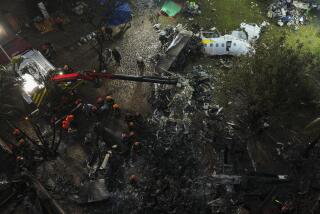Brazil replaces defense chief
- Share via
SAO PAULO, BRAZIL — President Luiz Inacio Lula da Silva on Wednesday ousted his defense minister amid escalating public fears about the safety and dependability of the country’s air traffic system, which is run by the military.
Waldir Pires, a longtime Lula confidant, was dismissed after months of aviation chaos and two deadly crashes in less than a year -- including one last week at Congonhas International Airport here that left 199 people dead, the worst air tragedy in Brazilian history.
Service disruptions have increased since that accident, leaving thousands stranded or facing long delays in a massive nation heavily dependent on air transit.
TAM, the nation’s leading airline, has canceled dozens of flights since July 17, when one of its jets skidded off a rain-slicked runway and crashed into a gas station and cargo building, bursting into flames. All 187 people on board and 12 people on the ground were killed.
Investigators are looking at mechanical problems, pilot error and runway conditions as possible causes.
Brazilians have expressed outrage as their nation’s air transport system has neared paralysis. Bus companies have reported greatly expanded business. The transportation bedlam has become a political crisis for Lula.
The president, often seen as slow to react to crisis, has been criticized for not acting sooner to revamp the country’s reeling air transport grid, even as usage has soared.
“The government took months to react politically because it didn’t understand the nature of the crisis,” said Renato Lessa, a political analyst in Rio de Janeiro.
Pires was replaced with former Supreme Court Justice Nelson Jobim, who was sworn in Wednesday. Experts immediately pointed out that Jobim, like his predecessor, has little knowledge of the intricacies of civil aviation -- and may also face difficulty persuading a stubborn military brass to change its ways.
“It’s very hard to have an eminently political man taking charge” of the military-controlled system, said Marcia Vairoletti, part of a civic group here critical of the government. “Military ministers won’t bow their heads to a civilian.”
At a swearing-in ceremony for Jobim, Lula acknowledged a fear of flying. “I put my fate in the hands of God,” the president said. “I do so because I’m in the hands of a captain, of a machine, of factors that human beings can’t always control.”
Pires was widely criticized for not addressing deficiencies in Brazil’s aviation system that were exposed in September when a Gol Airlines jetliner collided with a private plane over the Amazon jungle, killing all 154 people on the airliner. Months of delayed and canceled flights followed.
That incident had been Brazil’s worst aviation accident until last week’s harrowing crash ushered in another round of national mourning, finger-pointing and debate.
In the last week, authorities have unveiled a series of steps focused on reducing the congestion at Congonhas airport, the nation’s busiest. Lula announced plans to build another airport in Sao Paulo, South America’s largest metropolis with nearly 20 million residents.
Brazilian air traffic controllers, pilots and others have complained about outdated radio equipment, poor radar coverage and other shortcomings. Controllers have staged periodic work slowdowns to protest air-traffic problems and demand higher salaries.
This year, a federal court briefly closed the main runway at Congonhas after complaints that the strip was too short for large jets, especially in the rain. But an appeals court lifted the ban. Government officials have downplayed runway length as a factor in last week’s crash.
--
Special correspondent Soares reported from Sao Paulo and Times staff writer McDonnell from Buenos Aires.
More to Read
Sign up for Essential California
The most important California stories and recommendations in your inbox every morning.
You may occasionally receive promotional content from the Los Angeles Times.













